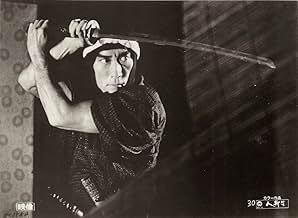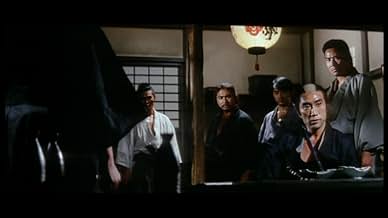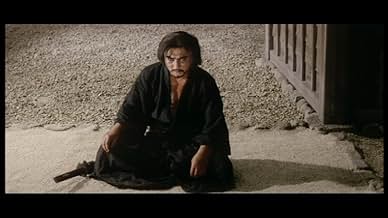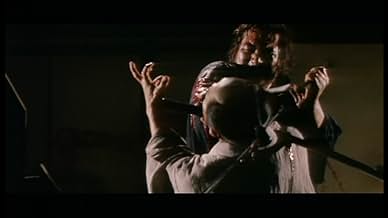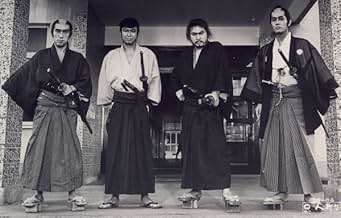Hitokiri
- 1969
- 2h 20min
CALIFICACIÓN DE IMDb
7.4/10
1.3 k
TU CALIFICACIÓN
Agrega una trama en tu idiomaA destitute ronin allies himself with an established clan, but its ruthless leader tries to turn him into a mindless killer.A destitute ronin allies himself with an established clan, but its ruthless leader tries to turn him into a mindless killer.A destitute ronin allies himself with an established clan, but its ruthless leader tries to turn him into a mindless killer.
- Dirección
- Guionistas
- Elenco
- Dirección
- Guionistas
- Todo el elenco y el equipo
- Producción, taquilla y más en IMDbPro
Opiniones destacadas
I love samurai movies, and I've spent a lot of time and energy to seek out them wherever and whenever possible to collect. Shintarô Katsu and Tatsuya Nakadai are both of the iconic actors in many great samurai movies. Yukio Mishima was one of the most famous and controversial Japanese writers in Japanese literature. A samurai movies with these three legendary actors and writers would suppose to be an even greater one, but regretfully, it just turned out to be such a disappointment. The whole movie was ruined by a very bad screenplay, then further ruined by a mediocre director. Something just didn't feel right from the very beginning, a somewhat weird and ridiculous storyline that just not ring true to a typical samurai genre movie. It's also the reason why I couldn't finish it.
9Jigo
Tenchu aka. Hitokiri- directed by Hideo Gosha - starring Shintaro Katsu and Tetsuya NAkadei belongs (together with Goyokin, HAra Kiri & Rebellion) to the best chambara movies existing.
Its the story about Shintaro Katsu (who plays Okada Izo) working for Nakadei, who wants to become the daymio. Okada, being the "cleaner" for Nakadei is being treated like a dog - and after quite a while he realises - what he realy is to Nakadei.
But there is so much more in this movie - every fan of japanese cinema should have seen it !!!!!!!
(Tenchu means Heavens Punishment)
Its the story about Shintaro Katsu (who plays Okada Izo) working for Nakadei, who wants to become the daymio. Okada, being the "cleaner" for Nakadei is being treated like a dog - and after quite a while he realises - what he realy is to Nakadei.
But there is so much more in this movie - every fan of japanese cinema should have seen it !!!!!!!
(Tenchu means Heavens Punishment)
This is one of the best of the genre. I saw it twice about 25yrs ago and have not had another opportunity to see it again since then. It rivals the Zatoichi series (also starring Katsu) in exciting swordplay.
This movie is a brilliant lesson on Japanese history set in at the end of the Tokugawa Shogunate shortly before the Shogunate lost a big battle against the loyalist, who wanted the emperor back on the throne to rule Japan. Really, I had to read a lot of history to get the entire background.
Shintaro Katsu (also known as the original Zatoichi) gives a superb performance as Izo Okada, one of the four Hitokiri(=Human Slayer) of the Bakumatsu. He is a simple samurai who looses all of his wealth. In order to have a good life he becomes a retainer of Takechi Hanpei (played by Tatsuya Nakada = Ryonosuke out of Sword of Doom). Hanpei is a ultra-nationalist politician who lets his band of Hitokiri assassinate a lot of high ranking pro-west politicians in order to achieve his political goals. Izo Okada follows his leader without really questioning what they are doing. As long as he has money to go and drink and spend at his whore. Okada's killings get more and more brutal in the course of the movie and he is proud to have a reputation based on fear wherever he goes.
It is a splendid portrait on the life of a simple samurai who gets caught up in political affairs and is really to naive to realize what is happening. First after being betrayed and tortured and always having talks with Sakamoto ( who is a samurai who rejects violence) does he change his ideas and views on life. But too late....
Watch the movie to see the end of Izo Okada...
Shintaro Katsu and the rest of the staff give a brilliant performance. Each actor reaches up to their role. The sword-fights a very unique and fast...probably faster than several movies nowadays...
Check it out if you have the chance!!!
Shintaro Katsu (also known as the original Zatoichi) gives a superb performance as Izo Okada, one of the four Hitokiri(=Human Slayer) of the Bakumatsu. He is a simple samurai who looses all of his wealth. In order to have a good life he becomes a retainer of Takechi Hanpei (played by Tatsuya Nakada = Ryonosuke out of Sword of Doom). Hanpei is a ultra-nationalist politician who lets his band of Hitokiri assassinate a lot of high ranking pro-west politicians in order to achieve his political goals. Izo Okada follows his leader without really questioning what they are doing. As long as he has money to go and drink and spend at his whore. Okada's killings get more and more brutal in the course of the movie and he is proud to have a reputation based on fear wherever he goes.
It is a splendid portrait on the life of a simple samurai who gets caught up in political affairs and is really to naive to realize what is happening. First after being betrayed and tortured and always having talks with Sakamoto ( who is a samurai who rejects violence) does he change his ideas and views on life. But too late....
Watch the movie to see the end of Izo Okada...
Shintaro Katsu and the rest of the staff give a brilliant performance. Each actor reaches up to their role. The sword-fights a very unique and fast...probably faster than several movies nowadays...
Check it out if you have the chance!!!
Many of the lead characters in Hideo Gosha's 1969 film "Hitokiri" (manslayer; aka "Tenchu" — heaven's punishment) were actual historical figures (in "western" name-order format): Ryoma Sakamoto, Hampeita Takechi, Shimbei Tanaka, Izo Okada, (?) Anenokoji. The name "Hitokiri," a historical term, refers to a group of four super-swordsmen who carried out numerous assassinations of key figures in the ruling Tokugawa Shogunate in the mid-1800s under the orders of Takechi, the leader of the "Loyalist" (i.e. ultra-nationalist, pro-Emperor) faction of the Tosa clan. What was this struggle about? Sad to say, you won't find out in this film. "Brilliant History Lesson" indeed!
No, Gosha is much more interested in showing you the usual bloody slicing and dicing and (at absurd length) the inner torment of the not-very-bright killer Izo Okada than in revealing actual history. Sakamoto, for example, was someone of historical significance, considered to be the father of the Imperial Japanese Navy. The closest Gosha comes to providing a history lesson is the scene in which Sakamoto, whom Takechi considers a traitor to the Loyalist cause, comes to Takechi's compound to try to sway him ideologically. He begins by talking about the international political/military situation, with foreign warships in Japan's ports and a Japan that is too weak militarily to defend against them. Want to know more? Sorry. Gosha cuts off this potentially fascinating lecture in mid sentence(!). So much for informing his audience about a turning point in Japanese history.
The film left me in utter confusion about the aims of the two sides in this struggle. For the two and a half centuries that the Shogunate held central power in Japan, it was an institution dedicated to preventing social change, to preserving the feudal relations of society. It was fearful of outside contamination, both ideological and technological. In keeping with this spirit, it outlawed firearms, those instruments of "leveling" in Europe and the Americas, with which a peasant could have stood up to a samurai. Throughout this period, the Emperor was nothing more than a spiritual figurehead.
But, in the towns, which developed in neutral zones between the feudal fiefdoms, a new class of merchants, landlords and craftsmen was forming — the class widely known in Europe by its French name, the bourgeoisie. Inevitably, as this new class gained strength, it chafed against the many confines of feudal society. As in Europe, the king (Emperor) became the central figure in the bourgeoisie's struggle for power against the feudal aristocracy. But a political leadership does not always fully understand the interests of the class it serves. When the outside world arrived with a bang in 1853, in the form of U.S. Admiral Perry's "Black Ships," the ruling elite of Japan were thrown into a crisis. Their military was no match for these foreigners. Also, they had heard about the havoc the British and French imperialists were wreaking in China. What should Japan do to save itself from the fate of its weak neighbor? Surprisingly, some elements within the usually isolationist Shogunate were inclined to open trade with the foreigners in order to obtain some of their advanced technology. This is the point of view represented (just barely) in the film by Sakamoto. On the other hand, the Emperor-loyal ultra-nationalists, represented by Takechi, believed they could keep out the foreigners by force, if only they could prevent the other faction from "selling out the country." (Sound familiar?) Thus, the assassination of key Shogunate figures is in order — and away we go.
Takechi's motivations were, for me, the film's biggest puzzle. Gosha suggests that he is fighting mainly for his personal advancement rather than for the Loyalist cause. Can we take this to represent the tenor of the Loyalists as a whole? (Do you care?)
Several reviewers compared this film favorably with "Goyokin," which Gosha made in the same year. But, where "Goyokin" is a crackling, suspenseful, adventure yarn, with a hero worthy of sympathy, "Hitokiri" is plodding, nowhere near as compelling and lacks such a hero. Sakamoto could have been this film's hero but we are not allowed to know him — nor what he stands for — well enough for him to achieve that status.
In view of his wonderful scores for five previous Kurosawa films, Masaru Sato's score here was very disappointing, sounding like something rejected from a "Bonanza" episode.
Barry Freed
No, Gosha is much more interested in showing you the usual bloody slicing and dicing and (at absurd length) the inner torment of the not-very-bright killer Izo Okada than in revealing actual history. Sakamoto, for example, was someone of historical significance, considered to be the father of the Imperial Japanese Navy. The closest Gosha comes to providing a history lesson is the scene in which Sakamoto, whom Takechi considers a traitor to the Loyalist cause, comes to Takechi's compound to try to sway him ideologically. He begins by talking about the international political/military situation, with foreign warships in Japan's ports and a Japan that is too weak militarily to defend against them. Want to know more? Sorry. Gosha cuts off this potentially fascinating lecture in mid sentence(!). So much for informing his audience about a turning point in Japanese history.
The film left me in utter confusion about the aims of the two sides in this struggle. For the two and a half centuries that the Shogunate held central power in Japan, it was an institution dedicated to preventing social change, to preserving the feudal relations of society. It was fearful of outside contamination, both ideological and technological. In keeping with this spirit, it outlawed firearms, those instruments of "leveling" in Europe and the Americas, with which a peasant could have stood up to a samurai. Throughout this period, the Emperor was nothing more than a spiritual figurehead.
But, in the towns, which developed in neutral zones between the feudal fiefdoms, a new class of merchants, landlords and craftsmen was forming — the class widely known in Europe by its French name, the bourgeoisie. Inevitably, as this new class gained strength, it chafed against the many confines of feudal society. As in Europe, the king (Emperor) became the central figure in the bourgeoisie's struggle for power against the feudal aristocracy. But a political leadership does not always fully understand the interests of the class it serves. When the outside world arrived with a bang in 1853, in the form of U.S. Admiral Perry's "Black Ships," the ruling elite of Japan were thrown into a crisis. Their military was no match for these foreigners. Also, they had heard about the havoc the British and French imperialists were wreaking in China. What should Japan do to save itself from the fate of its weak neighbor? Surprisingly, some elements within the usually isolationist Shogunate were inclined to open trade with the foreigners in order to obtain some of their advanced technology. This is the point of view represented (just barely) in the film by Sakamoto. On the other hand, the Emperor-loyal ultra-nationalists, represented by Takechi, believed they could keep out the foreigners by force, if only they could prevent the other faction from "selling out the country." (Sound familiar?) Thus, the assassination of key Shogunate figures is in order — and away we go.
Takechi's motivations were, for me, the film's biggest puzzle. Gosha suggests that he is fighting mainly for his personal advancement rather than for the Loyalist cause. Can we take this to represent the tenor of the Loyalists as a whole? (Do you care?)
Several reviewers compared this film favorably with "Goyokin," which Gosha made in the same year. But, where "Goyokin" is a crackling, suspenseful, adventure yarn, with a hero worthy of sympathy, "Hitokiri" is plodding, nowhere near as compelling and lacks such a hero. Sakamoto could have been this film's hero but we are not allowed to know him — nor what he stands for — well enough for him to achieve that status.
In view of his wonderful scores for five previous Kurosawa films, Masaru Sato's score here was very disappointing, sounding like something rejected from a "Bonanza" episode.
Barry Freed
¿Sabías que…?
- TriviaYukio Mishima's character commits seppuku and one year later, Mishima himself will commit the same way of ritual suicide.
- ConexionesVersion of Izo (2004)
Selecciones populares
Inicia sesión para calificar y agrega a la lista de videos para obtener recomendaciones personalizadas
- How long is Hitokiri?Con tecnología de Alexa
Detalles
- Tiempo de ejecución
- 2h 20min(140 min)
- Mezcla de sonido
- Relación de aspecto
- 2.35 : 1
Contribuir a esta página
Sugiere una edición o agrega el contenido que falta

